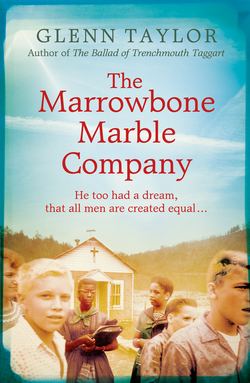Читать книгу The Marrowbone Marble Company - Glenn Taylor - Страница 6
ОглавлениеPrologue January 1969
THE GROUND WAS THE color of rust. Holes the size of half-dollars were every where, some encircled by tiny mounds of dirt. This was hard earth, nearly frozen. Dried-up leaves and spruce needles turned brown. A hush had befallen the land, as still as the inside of a coffin. Such quiet recalled a time before timber had framed houses and a church, before plumbing hooked in hot and cold, before electricity snaked conduit. The trees slept. The creek was iced over.
At the back of the hollow, there was piled ash and shingle. Sheet metal lengths. Two-by-fours at peculiar angles, their surfaces bubbled and cracked and black. There was a furnace stack, fifty feet high and made from fieldstone. It towered above all that fire had taken, but its mortar was crumbling. A strong wind would soon enough knock it down and stir the ash and frayed black picture-frame wire and lampshade bones below.
Snow came. It landed silent on a thick sheath of glass, the size and shape of a backyard pond. This glass had run molten, but now it was cooled, its edges rounded, frozen in rolls. A woman walked a circle around it. She held in her hands a Bolex 16mm movie camera. She filmed the glass. Thought for a moment she had seen a fish eye looking up at her from beneath.
This tract of land had known many names. Bonecutter Ridge, Marrowbone Cut, the Land of Canaan.
A German hog butcher named Knochenbauer had settled it in 1798. He’d entered into common-law marriage with an Indian woman and they’d raised children and grandchildren and made their surname Bonecutter. The Bonecutters lived on these five hundred West Virginia acres for 150 years. They were hard, proud people who prospered some times and went hungry others. They witnessed love and murder, fire and flood, until only two remained. It was left to them to hold on to the land. They did so with the sure grip that hill people possess.
Loyal Ledford came to this place in 1948, and for a time people again walked the ground. They followed paths beaten by the feet of those who’d walked the same routes before them. House to church to meeting hall to woods’ edge, and back to house. The people here made something real and good. They built with their hands. They put down roots. Ledford put his in deep. But his blood carried memories and his temper ran hot. In his dreams, hollows were flooded and people hid in holes they’d dug in the ground.
Ledford was apart from this world, and yet the people followed him. “Tell you what,” he once said to them. “We can stir the creek and wake up the trees. We can be a people freed.”
